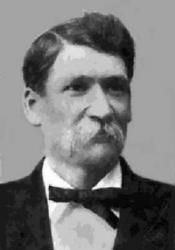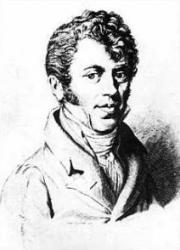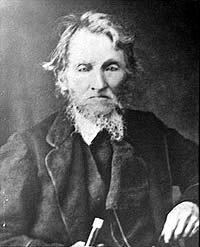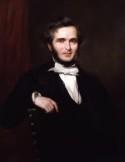Planning worship?
Check out our sister site, ZeteoSearch.org,
for 20+ additional resources related to your search.
- |
User Links
Person Results
János Victor
1888 - 1954 Translator (Hungarian) of "Jesus Loves Me" in The New Century Hymnal
János Victor
L. L. Pickett

1859 - 1928 Person Name: L. L. P. Author of "Speak to Me, Jesus" in The Golden Sheaf Rv Leander Lycurgus Pickett USA 1859-1928. Born at Burnsville, MS, he became a Methodist evangelist. He held meetings in several states and at Holiness campgrounds. After marrying Ludie, they served pastorates in northeast TX, and Columbia, SC, before moving to Wilmore, KY. Pickett married Pruvy Melviney Dorough in 1878, and they had a son, James, in 1880. After her death in 1887, he married Ludie in 1888. He was a renowned speaker, leader, minister, author, hymnwriter, and patriot, prominent in the Holiness Movement, and helped found Asbury College (now University), at Wilmore, KY, where he also served as the financial agent of the board of trustees for many years. The Picketts boarded m,inistry students attending Asbury, among whom was missionary E Stanley Jones. In 1905 a student prayer meeting at the Pickett home spilled out to the Asbury campus in a revival that spread around the town of Wilmore. Between 1891 and 1926 Pickett published 11 song books, some with others, including John Sweney, William J Kirkpatrick, John Bryant, Martin Knapp, Elisha A Hoffman, Burke Culpepper, William Marks, Benjamin Butts, and Robert McNeill. He died at Middlesboro, KY.
John Perry
L. L. Pickett
Mary P. Smith
Composer of "[There is a beautiful land]" in The Little Sower for Sabbath Schools
Mary P. Smith
Sigismund Neukomm

1778 - 1858 Composer of "AMES" in The Psalter Sigismund Ritter von Neukomm, b. Salzburg, 1778; d. Paris 1858
Evangelical Lutheran Hymnal, 1908
Sigismund Neukomm
Lorenzo Lyons

1807 - 1886 Person Name: Laiana, 19th century Translator (Hawaiian) of "Jesus Loves Me" in The New Century Hymnal Lorenzo Lyons also known as Makua Laiana, missionary to Hawaii.
Dianne Shapiro
Lorenzo Lyons
Chrysogonus Waddell
1930 - 2008 Person Name: Chrysogonus Waddell, OCSO, b. 1930 Author of "Jesus Took a Towel" in Journeysongs (2nd ed.)
Chrysogonus Waddell
John Curwen

1816 - 1880 Person Name: John Curwen, 1817-1880 Author of "Oh, What has Jesus Done for me?" in Hymnal and Order of Service Curwen, John, son of the Rev. S. Curwen, of an old Cumberland family, born at Heckmondwike, Yorkshire, Nov. 14, 1816, and educated at Coward College, and University College, London. In 1838 he became assistant minister in the Independent Church, Basingstoke; co-pastor at Stowmarket in 1841, and pastor at Plaistow, Essex, in 1844. There he developed and promoted the Tonic Sol-fa method of teaching to sing, using it in his own schools and church, and lecturing upon it in various parts of the country. Resigning his ministry through ill health, in 1867, he established a printing and publishing business in order the better to create a Tonic Sol-fa literature. In 1853 he assisted in founding the Tonic Sol-fa Association, for the promotion of that method of singing, and in 1862 the Tonic Sol-fa College. He died May 25, 1880. Besides a number of works explanatory of the Tonic Sol-fa system, Mr. Curwen was the compiler of Sacred Songs, 1840, and Hymns & Chants, 1844. In 1846 these were combined as The Child's Own Hymn Book. This was enlarged in 1865, and recast as The New Child’ s Own Hymn Book in 1874. As a Sunday-school hymn-book this collection has been exceedingly and deservedly popular.
For it Mr. Curwen composed two hymns:—
1. I'm a little Pilgrim. Pressing Heavenwards. This was written in place of another with the same first line, whose author had refused permission for its use in Mr. Curwen's book. The time and chorus usually sung with it are American.
2. 0 what has Jesus done for me? Passiontide. This was also written in place of another having the same line.
These are the only hymns known to be his The Sabbath Hymn Book, Lond. 1859, was also edited by Mr. Curwen. [Rev. W. R. Stevenson, M.A.]
--John Julian, Dictionary of Hymnology (1907)
John Curwen
John L. Newkirk
Author of "Waiting for the Promise" in Songs of Praise and Salvation
John L. Newkirk
AnnaMae Meyer Bush
b. 1947 Author of "Let the Children Come" in Singing the New Testament
AnnaMae Meyer Bush


 My Starred Hymns
My Starred Hymns

